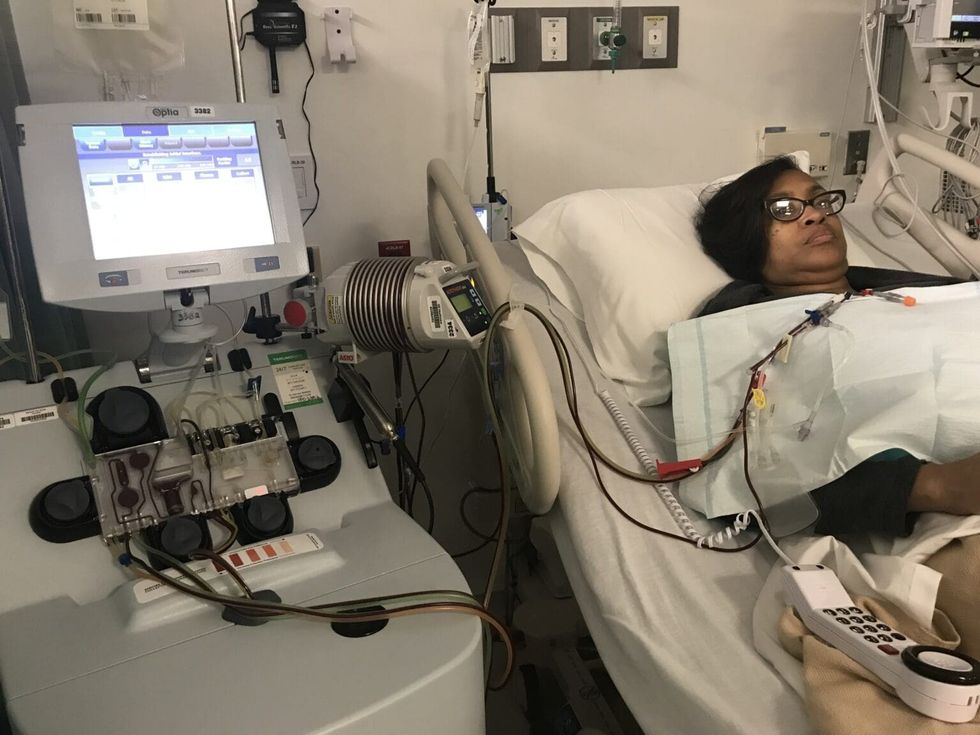Although there might not have been many ribbons flying during March for Multiple Myeloma Awareness Month, the message is awareness is engraved deep in the soul of cancer survivor, Karen Williams.
Statics from the American Cancer Society states that in the United States, the average lifetime risk of getting multiple myeloma is about 1 in 103 for men and about 1 in 131 for women. But each person’s risk might be higher or lower than this, based on their risk factors. Obesity increases your risk of getting the disease.
Six years ago, back pain from a car accident led Williams to the hospital. After a bone biopsy, she received a cancer diagnosis that would change her life.
The test results revealed that she had multiple myeloma.According to the Centers for Disease Control, Myeloma, also called multiple myeloma, is a cancer of the plasma cells. Plasma cells are white blood cells that make antibodies that protect us from infection. In myeloma, the cells grow too much, crowding out normal cells in the bone marrow that make red blood cells, platelets, and other white blood cells.
There are three forms of Multiple myeloma.
- Multiple myeloma, the most common type of plasma cell tumor, develops in the bone marrow and can spread throughout the body.
- Solitary plasmacytoma is a single plasma cell tumor that develops in one part of the body, often in a bone.
- Extramedullary plasmacytoma is a plasma cell tumor that develops outside of the bones in soft tissue, such as the lung or throat.
“I still remember the doctor asking me if I understood what he said. All I could think was that I had been given a cancer diagnosis,” said Williams who didn’t have any symptoms other than the pain in her back.
Sometimes myeloma does not cause any symptoms. It may be found when a blood or urine test is done for another condition and a higher-than-normal level of protein is found. Some more advanced, symptoms of myeloma may include bone pain, especially in the back or ribs; bones that break easily; fever for no known reason; frequent infections; bruising or bleeding easily; trouble breathing; weakness of the arms or legs; and feeling very tired.
“I think for me the loss of energy was the hardest thing to deal with. My children didn’t live with me in Dallas. In fact, my daughter was stationed in Korea at the time I was diagnosed.
Telling my kids that I had cancer by phone and not being able to hold them and see them every day while I was going through seemed to be the hardest thing for me,” said Williams.
African Americans are disproportionately affected by multiple myeloma compared to other racial and ethnic groups. Studies have consistently shown that African Americans have a higher incident rate and earlier onset for multiple myeloma compared to Caucasians, and within the African American community, women are often diagnosed at a younger age compared to men.
After her diagnosis, Wiliams had many questions such as, “What are my treatment options? What’s the plan, and when do we get started?”
She was diagnosed in stage 2 of the disease, and her treatment started immediately.
“I received a Velcade shot in my abdomen. I took a total of 22 pills. I took 10 steroid pills, 11 chemo pills, and then one nausea pill. I did that every week for 16 weeks. Then I got a break so that they could do another bone marrow biopsy,” said Williams.
According to Williams, the test showed that the levels of cancer in her body had significantly decreased.
“Even though there is no actual cure for multiple myeloma it is treatable. People need to know that just because it’s cancer, does not always mean a death sentence.
I am grateful for my medical team, but I am more grateful that God allowed me to get through my treatment. I never thought that I would have to walk through a cancer journey. However, it taught me so much and it allowed my pain to turn into my praise. My misery has become a message that I can use to encourage other people,” said Williams.
The Mayo Clinic states that multiple myeloma treatment isn’t always needed right away. If the multiple myeloma is slow growing and isn’t causing symptoms, close watching might be the first step. For people with multiple myeloma who need treatment, there are a number of ways to help control the disease.




















